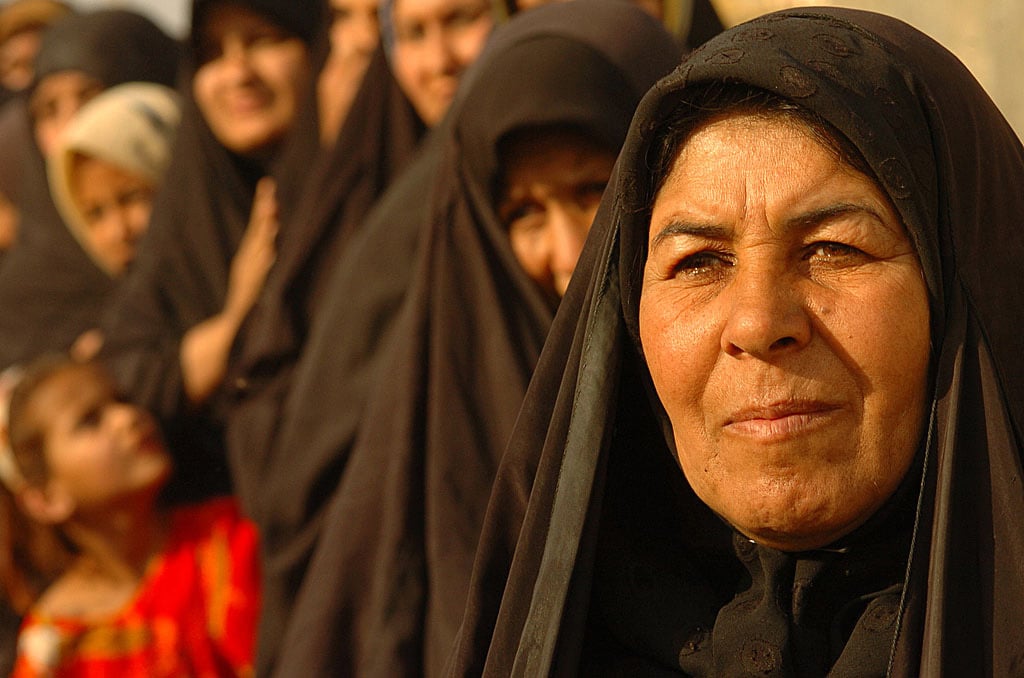Impact in Iraq: When Women Speak Out
WITH YOUR SUPPORT, NP HAS BEEN WORKING WITH WOMEN IN SOUTH MOSUL TO ADVOCATE FOR INCREASED SAFETY AND SECURITY.
In South Mosul, Iraq, Zeena* and other women in her community face daily threats of gender-based violence (GBV), including harassment and domestic abuse. By living in the local community, NP was able to build deep trust in the area through constant engagement, visibility in public at all hours, and relationship building with both leadership and citizens—especially women and girls.
“I am telling you now. Before NP started doing all this work, I never imagined that I could come to any public institutions and report on issues,”
Zeena from Qayyarah shared during a community meeting in South Mosul.

As we built relationships with Zeena and the greater community in South Mosul, women increasingly asked us to engage with them on how to address the daily violence they face. And they wanted us to support them in engaging with the people who should be providing protection to women, such as government officials, police, and other security forces.
Engaging the Community
To reach adult women, NP informally met with women in their homes. We worked with women we had built strong relationships within the community, like Zeena, for example. Zeena would invite her neighbors and relatives over to her house, and it would turn into a group of 20-30 women who would join NP. From sexual
harassment in public spaces to domestic violence, NP heard the women’s concerns directly. The team supported these women as they shared their needs and strategized on how to address them.
To reach young women, NP held a training series for youth—both boys and girls. Youth from youth councils,
schools, informal local leadership, and existing local volunteer initiatives showed up. While many young people are keen to affect positive changes in their communities, young women are completely excluded from local decision-making (and young men allowed only a small role), even though they have a huge appetite to engage their own communities on the issues affecting them.
The seemingly simple act of having these community gatherings built collective power among the women and youth. They built solidarity and support among each other by being able to talk together about the violence they often experience, violence that persists in part because it hides in the shadows and remains silent.
Providing a Safe Space
But NP’s work didn’t stop there. Because the concern was not only about the violence itself, but also the lack of protection from the groups women expected protection from, we worked with the women to take the next step. From these conversations and trainings, a group of 25 adult and young women decided to raise their voices and concerns and joined NP’s Community Security Forums to talk with security actors and government agencies directly. Based on the women’s concerns, NP invited local officials to the meetings.
"We used the space … to raise our concerns regarding the police’s abdication of their responsibility to protect women and failure to prevent GBV."
These meetings are an opportunity for mutual trust building between the community and these security and government officials. The officials begin to recognize the women as proactive and engaged community members, and the women, in turn, see increasing responsiveness and good governance on the officials’ part. Everyone involved felt this meeting was a positive step forward. The Municipality Director, for example, shared that “this is my first meeting with women to learn about their issues related to the municipality because most of the people who visit my office are men.”
The forums also continue to be a safe space for the women attendees to advocate on deeply embedded and challenging protection risks such as GBV – a topic seen as taboo that is now being discussed openly. Not only can the women like Zeena now discuss these issues among themselves, some for the first time, but also now as a powerful group of women speaking out in a public forum. As this violence continues to come out of the shadows, it loses its power.
Zeena has already seen concrete changes. At the Community Security Forums, the women asked for the police to take their issues seriously and change their behaviors as a result. They now patrol and provide presence near schools where Zeena had not wanted to send her daughter because she experienced harassment outside the school. Zeena’s daughter told her she already feels safer on her way to and from school, and can focus more on studying. And Zeena’s family isn’t the only one impacted. Zeena and her daughter are just one of the hundreds of women and girls in this community who are now safer.
NP will continue to work with this group of engaged women to create community protection teams. These teams will provide more trainings on gender-based violence to the community and schools and promote public campaigns for violence prevention. NP will also begin projects specifically with men to talk to other men to decrease domestic violence, as well. All of these efforts will work hand-in-hand to build a society free from violence for Zeena, her daughter, and all women in South Mosul.
